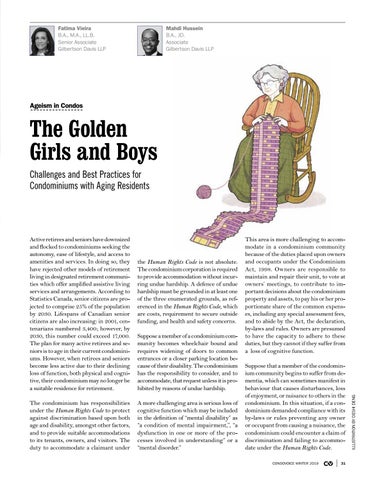Fatima Vieira B.A., M.A., LL.B. Senior Associate Gilbertson Davis LLP
Mahdi Hussein B.A., JD. Associate Gilbertson Davis LLP
Ageism in Condos
The Golden Girls and Boys Challenges and Best Practices for Condominiums with Aging Residents
The condominium has responsibilities under the Human Rights Code to protect against discrimination based upon both age and disability, amongst other factors, and to provide suitable accommodations to its tenants, owners, and visitors. The duty to accommodate a claimant under
the Human Rights Code is not absolute. The condominium corporation is required to provide accommodation without incurring undue hardship. A defence of undue hardship must be grounded in at least one of the three enumerated grounds, as referenced in the Human Rights Code, which are costs, requirement to secure outside funding, and health and safety concerns. Suppose a member of a condominium community becomes wheelchair bound and requires widening of doors to common entrances or a closer parking location because of their disability. The condominium has the responsibility to consider, and to accommodate, that request unless it is prohibited by reasons of undue hardship. A more challenging area is serious loss of cognitive function which may be included in the definition of “mental disability” as “a condition of mental impairment,”, “a dysfunction in one or more of the processes involved in understanding” or a “mental disorder.”
This area is more challenging to accommodate in a condominium community because of the duties placed upon owners and occupants under the Condominium Act, 1998. Owners are responsible to maintain and repair their unit, to vote at owners’ meetings, to contribute to important decisions about the condominium property and assets, to pay his or her proportionate share of the common expenses, including any special assessment fees, and to abide by the Act, the declaration, by-laws and rules. Owners are presumed to have the capacity to adhere to these duties, but they cannot if they suffer from a loss of cognitive function. Suppose that a member of the condominium community begins to suffer from dementia, which can sometimes manifest in behaviour that causes disturbances, loss of enjoyment, or nuisance to others in the condominium. In this situation, if a condominium demanded compliance with its by-laws or rules preventing any owner or occupant from causing a nuisance, the condominium could encounter a claim of discrimination and failing to accommodate under the Human Rights Code. CONDOVOICE WINTER 2019
CV
31
ILLUSTRATION BY DESHI DENG
Active retirees and seniors have downsized and flocked to condominiums seeking the autonomy, ease of lifestyle, and access to amenities and services. In doing so, they have rejected other models of retirement living in designated retirement communities which offer amplified assistive living services and arrangements. According to Statistics Canada, senior citizens are projected to comprise 25% of the population by 2030. Lifespans of Canadian senior citizens are also increasing: in 2001, centenarians numbered 3,400; however, by 2030, this number could exceed 17,000. The plan for many active retirees and seniors is to age in their current condominiums. However, when retirees and seniors become less active due to their declining loss of function, both physical and cognitive, their condominium may no longer be a suitable residence for retirement.
